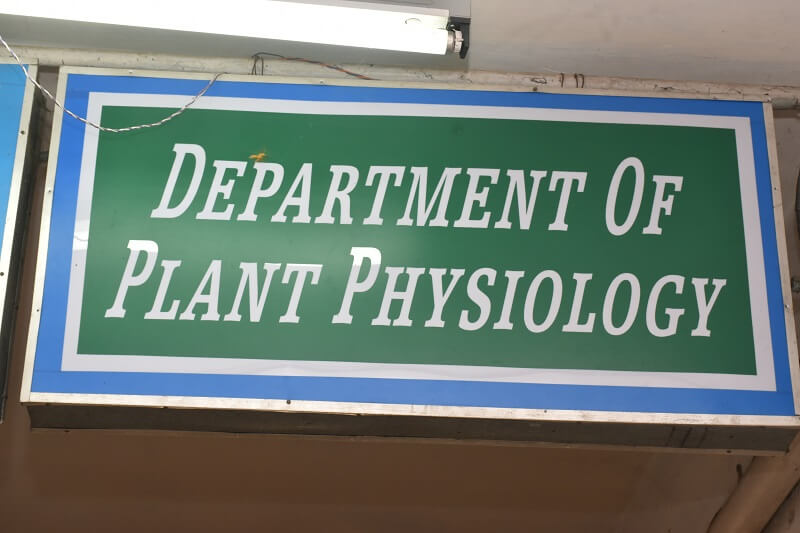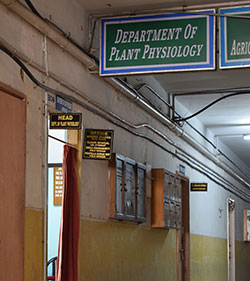The Department of Plant Physiology was started under the Faculty of Agriculture since 15th February, 1999 consequent upon the quadri-partitioning of erstwhile Department of Genetics and Plant Breeding. There were seven sanctioned teaching posts and five non-teaching posts in the Department at the time of inception. Since its inception, the Department is actively engaged in catering a number of basic and advance courses on crop physiology at under-graduate and post-graduate (including Ph.D.) levels. The faculty members of the Department are engaged in basic and applied researches on crop physiology, abiotic stress physiology (drought, salinity, heat and heavy metal stress), nutrio-physiology, reproductive biology and forage physiology. About 47 students have been awarded their M.Sc. degree, while 16 students have been awarded Ph.D. degree under this department till 2017. The students of this department have received different fellowships at All India level like INSPIRE Fellowship, National Fellowship for Higher Education (NFHE) of SC and ST students, Maulana Azad National Fellowship for Minority Students, National Fellowship for students of OBC for pursuing Ph. D. degree. Some of the students successfully qualified in National Eligibility Test (NET) under Agricultural Research Service (ARS) at different times. The students passed from this department have been placed in several prestigious jobs like Assistant Botanist in West Bengal Agricultural Service (Research), Assistant Director of Agriculture, Faculties in other Universities/Colleges etc. The faculties and research students of this department regularly participate and present their important research findings in different national and international seminars and symposia.
Mission
In the process of achieving the task, the Department realizes that only way to fulfill these targets is to build excellent human resources that will continue to enrich the academic standards and will address the various issues of crop physiological research. The Department emphasizes on developing the necessary conceptual and experimental skills in students and young researchers. While guarding the traditional approaches used in the studies related to crop growth and productivity, recent developments in various fields of plant physiology and molecular biology have been added to teaching and research curricula. Through teaching, scholarship, and service, the Department of Plant Physiology provides educational experiences that encourage students to learn, think and apply knowledge and practical experiences in the field of agriculture for crop improvement, sustenance of crop productivity in a stressful environment and to evolve climate resilient crop varieties. The curriculum foci range from local to global issues. We encourage and support participation of faculties and research scholars in national and international seminars and symposia as well as to communicate the research findings through publications and relevant outreach programs to enhance the quality of research and studies.
Vision
The Department of Plant Physiology aspires to provide its students with academic programs and experiential learning opportunities that will develop their understanding of crop physiology and its applicability in crop improvement. The Department has set itself the vision to work in different areas of plant science including physiogical basis of yield enhancement and its maneuvering through application of plant growth regulators and micronutrients, developing crops tolerant to abiotic stresses like drought, salinity, high temperature stress, metal toxicity and mitigation of stress, large scale soil less culture of plants and development of plant diagnostic manuals through soil less culture. In addition to strong disciplinary knowledge, we emphasize on interdisciplinary awareness among the students for development of collaborative approaches towards crop research. We also endeavor to integrate the department's mission of teaching with the pursuit of scholarship and service activities of the students to maintain the highest degree of professionalism in educating and mentoring our students as we prepare them for their future careers. In addition, we strive for a stimulating, inclusive, and healthy work environment where the rights of faculty, staff, and students are respected, where their contributions are fairly recognized.
Intake of Post-graduate Students:
Intake of M.Sc. students :
| Category | Number of seats |
|---|---|
| General | 03 |
| Scheduled Caste | 01 |
| Other Backward Class | 01 |
| ICAR Nominated | 02 |
| Toal | 07 |
Intake distribution of Ph.D. students :
| Category | Number of seats |
|---|---|
| University Research Scholars | Not more than 2 |
| Self-financed category | Not more than 2 |
| Fellowship in Projects | Depends on the Vacancy in project |
Courses Offered
To develop concept as well as experimental skills in the field of the discipline, the students and young researchers are offered the following courses at the UG, master degree and doctoral levels:
Courses offered at UG:
| Course Number | Title of the course | Credit hours | Semester |
|---|---|---|---|
| PPH 157 | Fundamentals of Crop Physiology | 1+1 | 2nd |
| PPH (H) 157 | Fundamentals of Crop Physiology | 1+1 | 2nd (Horticulture ) |
| EC 315 | Plant Developmental Biology | 2+1 | 5th |
Courses offered in M.Sc:
| Course Number | Title of the course | Credit |
|---|---|---|
| 1st Semester | ||
| PPH 501 | Principles of Plant Physiology | 3+1 |
| PPH 502 | Plant Water Relationship | 2+1 |
| PPH 503 | Crop Physiology | 2+1 |
| PPH 504 | Mineral Nutrition | 2+1 |
| PPH 505 | Hormonal Regulation of Plant Growth and Development | 2+1 |
| 2nd Semester | ||
| PPH 551 | Plant Metabolism-I | 1+0 |
| PPH 552 | Physiological and Molecular Responses of Plants to Abiotic Stresses | 2+1 |
| PPH 553 | Physiology of in vitro Cell Differentiation | 2+1 |
| PPH 554 | Genome Organization in Higher Plants | 2+1 |
| PPH 555 | Experimental Plant Physiology | 2+1 |
| 3rd Semester | ||
| PPH 601* | Plant Metabolism-II | 1+1 |
| PPH 602 | Seed Physiology | 2+1 |
| PPH 603 | Biological Nitrogen Fixation | 2+0 |
| PPH 604 | Senescence and Abscission | 2+0 |
| PPH 649 | Seminar-I | 1+0 |
| 4th Semester | ||
| PPH 651* | Physiology of Crop Plants – Specific Case Studies | 2+0 |
| PPH 652* | Physiological and Molecular Aspects of Photosynthesis-carbon Assimilation | 2+1 |
| PPH 653 | Physiology of Reproduction | 2+0 |
| PPH 699 | Seminar-II | 1+0 |
Courses offered in Ph.D:
| Course Number | Title of the course | Credit |
|---|---|---|
| 1st Semester | ||
| PPH 701 | Advances in Photo Biology | 2+0 |
| PPH 702 | Functional Genomics and Genes Associated with a Few Physiological Processes | 2+0 |
| 2nd Semester | ||
| PPH 751 | Signal Perceptions and Transduction and Regulation of Physiological Processes | 2+0 |
| PPH752 | Molecular Approaches for Improving Physiological Traits | 2+1 |
| PPH 799 | Seminar-I | 1+0 |
| 3rd Semester | ||
| PPH 801 | Weed Physiology and Herbicide Action | 1+1 |
| PPH 849 | Seminar-II | 1+0 |
| 4th Semester | ||
| PPH 901 | Post Harvest Physiology | 2+1 |
| PPH 902* | Climate Change and Crop Growth | 2+0 |
| 5th Semester | ||
| NIl | ||
| 6th to Fourteenth Semester | ||
| PPH 999 | Seminar -III | 1+0 |
* Pre-requisite courses are to be completed before enrollment in these courses.
Infrastructure / Facilities
| Sl.No. | Lab/Rooms | Instruments |
|---|---|---|
| 1 | PG Practical Laboratory | 1.Table Top Centrifuge |
| 2.Spectrophotometer | ||
| 3. Hot Air Drying oven | ||
| 4. Hot water bath | ||
| 5. Soxhlet apparatus | ||
| 6. Dhona Single Pan Balance | ||
| 7.Electronic BalanceHigh Speed Cooling Centrifuge | ||
| 8. Horizontal Shaker | ||
| 9. Seed Germinator | ||
| 10. Microscope (Mono) Kyowa-Getner | ||
| 11. Common Microscopes | ||
| 12. Laboratory Willey Mill | ||
| 13. Refrigerator | ||
| 14. BOD incubator | ||
| 15. Autoclave | ||
| 16. Distillation set | ||
| 17. Photosynthesis system (CI-340) | ||
| 18. BiovisLeaf Area Meter (portable) | ||
| 2 | Plant Tissue Culture Laboratory | 1. Laminar Air Flow |
| 2. Culture Racks | ||
| 3 | PG Laboratory I | 1.Table Top Centrifuge |
| 2. Spectrophotometer | ||
| 3. Drying oven (thermostatic) | ||
| 4. Hot Water Bath ( thermostatic) | ||
| 5. DhonaElectical Balance | ||
| 6. Electronic balance | ||
| 7. Metal distillation set | ||
| 8. Refrigerator | ||
| 4 | PG Laboratory II | 1. Digital pH meter, |
| 2. Sartorius Analytical Balance | ||
| 3. UV-VIS single beam spectrophotometer (200-1000 nm) Type 118 | ||
| 4. Digital Conductivity Meter | ||
| 5. Spectrophotometer Model –NV-503 | ||
| 6. Refrigerator | ||
| 7. Gel Electrophoresis System-(casting unit and power pack) | ||
| 5 | PG Laboratory III | 1. Spectrophotometer |
| 2. Refrigerator | ||
| 3. Hot Air Drying oven with thermostatic control (one) | ||
| 4. Hot water bath (thermostat control) (one) | ||
| 5. Metal distillation set | ||
| 6. DhonaElectical Balance | ||
| 7. Table Top centrifuge |


